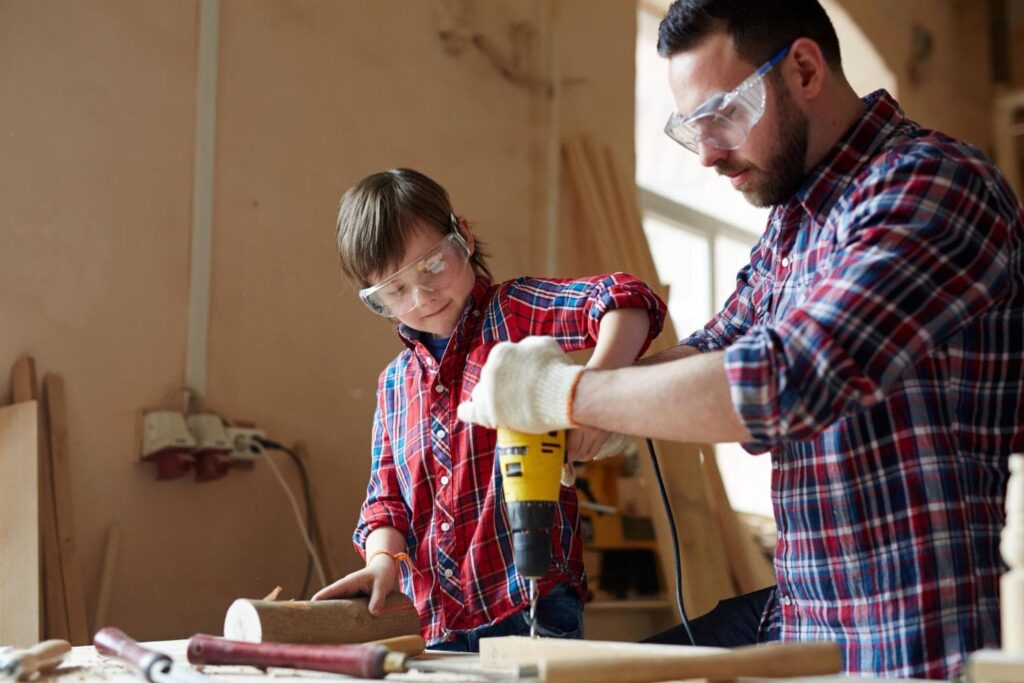One of the most useful skills to have, in my opinion, is the ability to do home repair projects. Yes, some of them are too big for non professionals to do, but there are many skills that are quick to learn and save a lot of money because you don’t need to call a repairman every time.
I recently did quite a few repair projects around my house and have been teaching my kids how to do them, such as unclogging sinks and installing new ones. With these skills, hopefully when they have their own home they will be able to take care of these issues themselves instead of paying a professional.

Is your home looking a little worse for wear? Does it feel like things are constantly breaking or falling apart? Does the idea of hiring a contractor to do expensive repairs make you uneasy? If all of this is relatable, then you’ve got an opportunity to make your home more functional, save money on repairs, and teach your kids some valuable skills while you’re at it.
DIY (do it yourself) home repairs are very popular with homeowners. When you’re the one doing the home repairs, you can have more control over the budget, the timeline, and the vision. It can be a win-win kind of situation that you can share with your children too. Let’s examine what you can teach kids as you tackle DIY home repairs.
Start with a Budget
While you may be tempted to jump right into home repairs, it’s important to set the right precedent for your kids to see. A home repair project should be well-planned and start with a realistic budget. Without a budget, you have no idea if the project will be affordable or worth doing.
When building a budget, make sure you factor in the materials, any permits that may be required, and a little extra in case you run into issues. Once the project gets underway, it can prove to be more challenging and involved than originally thought. This is exactly why you need to set contingency funds for unexpected challenges. If you’re having a hard time building the budget, there are tools and guides online that can help.
Why It Can Make More Financial Sense to Do the Repairs Yourself
Now that you’ve made a budget for the repairs, you’ve got hard data to show kids regarding the savings of a DIY project versus hiring a contractor. A contractor’s quote will include the materials and labor, with labor usually being the most expensive part. Saving on home repairs leaves extra funds for other purposes. The money saved on home repairs can instead be used on fun things like a family vacation or just to spoil yourself with some online gaming or the best cash app casinos.
There’s no set amount that you save doing DIY home repairs, but some experts in the field say it can be as much as 80% savings. That is significant and could mean the difference between repairing the issue and ignoring it.
Don’t Get in Over Your Head
Before starting, think the project through to ensure it’s manageable. Many home repairs require little to no experience. With patience and research, you can easily master them. However, there are also home repair projects that no one should try to do themselves because they are too complex or even dangerous.
Some good examples of fixes that may be over your head are plumbing and electrical repairs. Without the right training and experience, you can exacerbate the issue. There’s also a chance you hurt yourself in the process, especially when dealing with electrical repairs. It’s always best to leave these high-skill repair jobs to the professionals.
Do You Have the Right Tools and Materials?
Another tip that fits perfectly into the planning process is to gather all the tools and materials needed. It is extremely frustrating to be in the middle of a project only to realize you’re missing a key item. Purchasing the materials can also take weeks, even months, depending on what you need. A great example is flooring or countertops that often need to be ordered weeks in advance.
If you’re unsure about the tools you’ll need, try looking up some project tutorials online or on YouTube. They will go over the items needed in your toolkit. Before you rush out and purchase expensive tools that you might only use once, consider borrowing items from a family member, friend, or even a neighbor.
There’s Nothing Wrong with Asking for Help
What happens if you watch some tutorials and you still feel confused about the repair? In this case, it can make sense to ask for help. A perfect place to get help is at your local hardware store. The customer service representatives usually have a fair amount of knowledge on simple repairs, so they can at least give you some basic tips and advice. If you’ve already started the repairs and you’re stuck and unsure of what to do next, again, don’t be afraid to ask for help.
If the problem proves more complex than expected and the help at the hardware store proves insufficient, hiring a contractor may be necessary. Proceeding without expertise can cause additional damage and cost more money in the long run.
Make Safety the Top Priority
Finally, be sure to teach kids about safety when they undertake any home repairs. No matter how simple the repair may seem, safety should always come first.
To ensure a safe environment, here are some key measures to consider:
- Using a spotter when climbing a ladder.
- Lifting heavy items with proper posture.
- Handling tools safely.
- Wearing protective gear such as safety glasses.
Use Home Repairs as a Teachable and Bonding Moment with Kids
If you’ve got any home repairs to tackle, why not turn a negative into a positive? You can teach the kids repair and safety skills, introduce them to budgeting, and bond with them during the process. Who would have thought home repairs could turn into a fun family activity?




